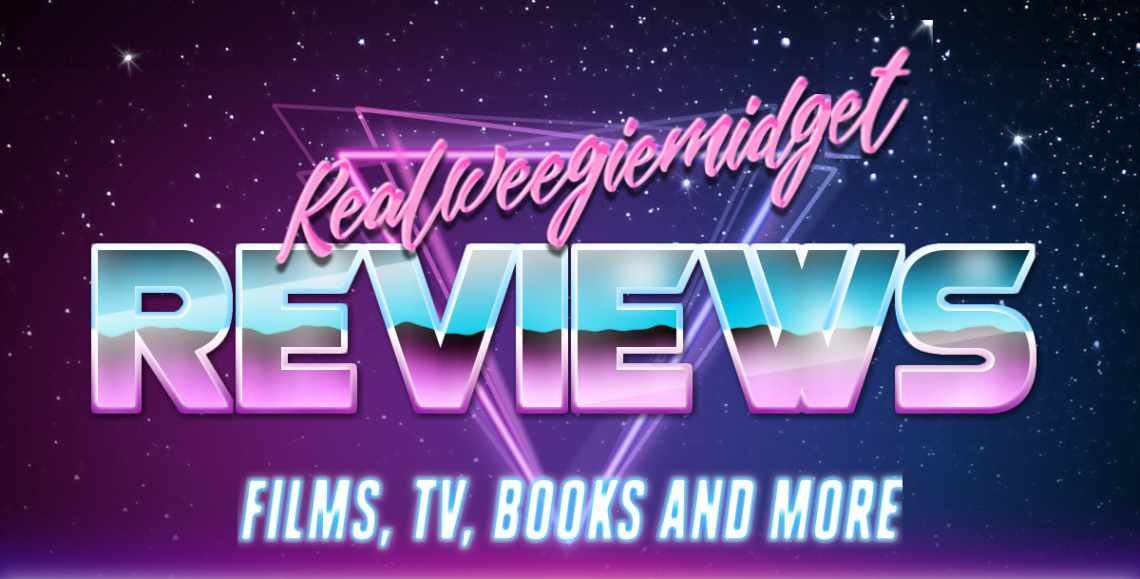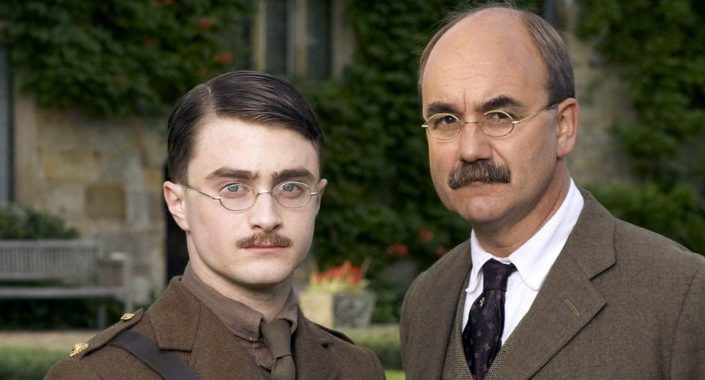#2000s #AllPosts
My son, the hero…
Tells the story of the author Rudyard Kipling and his only son, Jack who died in battle in the early days of World War I.
Daniel Radcliffe My Boy Jack 2007 trailer, RadcliffeGrint2016 and photos © PBS / ITV 1
Rudyard Kipling wrote many poems and stories of young boys in adventure tales such as The Jungle Book and Kim. Rudyard’s most poignant and heartfelt tale was based on his true personal story told in the poem My Boy Jack.
This poem was believed to be cathartic and told of the loss of his only son Jack in World War I. The film My Boy Jack (2007) tells the story of Rudyard Kipling and his family from just before his only son Jack enlists in the war to the aftermath of his death at the Battle of Loos.
As a kid in Scotland, I studied World War I in history and English lessons at secondary school. This through what were then difficult to remember facts and figures such as battles and dates in the former, and the Great War Poets, Siegfried Sassoon and Wilfred Owen, in the latter. The Great War poems made more impact on me, with many with these authors’ true tales in rhyme.
Fast forward a few years, and I watched Shadowlands (1993), the story of C S Lewis (Anthony Hopkins), and his love for the American poet Joy Gresham (Debra Winger). This was one of the first true biopics I remember that made an impression on me (but there were no doubt more) in this tale of Lewis’ love and loss of his beloved Joy to illness. Again this film was based on a true story that got my interest.
Since then, I’ve lived, loved, laughed and at times lost with many a real-life scientist, inventor, actor or actress through this particular film and TV genre. I’ve celebrated the subject’s highs and been saddened by the lows in their life stories. But I always take note that it is based on a true story.
The films often led to subsequent searches to find out all the facts. This is true for the world of film and TV biopics about Beatrix Potter (Miss Potter (2006)) to Judy Garland (Life with Judy Garland: Me and My Shadows (2001)) and films about (with titular characters) Ed Wood (1994) to Eddie the Eagle (2015).
Without a doubt, this is my favourite genre both on-screen and in books, be it autobiography or biographical tributes. My Darlin Husband brought my love of history and these films by suggesting I review this TV Movie. The film is based on a true story that I hadn’t heard before. In this TV Movie, the actor David Haig brings to life the wee screen adaptation of his 1997 play based on this true story.
It starts in England in 1914 with two simultaneous stories of the Kipling men, Rudyard (Haig) and his son Jack (Daniel Radcliffe). Rudyard visiting the then King George V. The pair jovially celebrated the time his quick journey took from his home to Windsor. The pair briefly exchange news on their sons. The King is aware of Kipling’s passionate anti-German feelings. Kipling has strong concerns that Britain will be invaded by Germany.
Meanwhile, Jack hopes to join the British Navy to fight the Germans. His interviewer tells Jack that he is a fan of his father’s books. Jack who wears spectacles for his poor eyesight, struggles without his spectacles at the eye test.
However, Jack is turned down by the Navy as he is severely short-sighted. This news riles his father, who has strong anti-German feelings. He believes that anyone keen to fight for his country should. Rudyard shares his views and fears through propaganda and public speeches.
Undeterred – yet devastated – by his recent failed interview, Jack hopes to join the army. But this was on his own terms and not due to his father’s fame or influence. Again his bad eyesight lets him down. The interviewer reports concerns for both his and others’ lives in battle. After his father pulls a few strings, Jack is accepted for an officer’s commission as a Second Lieutenant in the Irish Guards.
Her son’s commission upsets his mother Carrie, (Kim Cattrall) and his young sister Elsie (Carey Mulligan). Elsie believes Jack is being unduly coerced by their father, and Carrie is concerned due to Jack’s young age as he is only 17. Due to his young age, he has to request his father’s approval to go to war. Rudyard agreed to this.
The women are also concerned due to Jack’s eyesight difficulties. It’s revealed that the family was once five, with a daughter who passed away. Jack has a closer relationship with his sister. In a scene with the siblings, Jack confides he hopes for adventure away from the stifling atmosphere in the family home.
After he joins the troops, Jack proves himself a worthy soldier, shown by his dedication and determination during training. In charge of his platoon, he proves supportive and emphatic to his men’s needs and is a strong leader. After a short time, he is deployed to France, where he leads his men in the battle at Loos.
Sadly, the day after his birthday celebrations with his men, Jack is reported as missing in action after leading his platoon into battle. The family are informed of this news in a telegram. The Kipling family are left to piece together Jack’s moments in this battle.
Over three years the family hope against hope, as they contact hospitals, and interview his colleagues and others in vain as they hope that Jack is still alive. They piece together his movements. On interviewing one of the Irish Guards he was stationed with in battle, the family learn the sad details of Jack’s heroic death. It’s told that Jack lost his spectacles in the mud at Loos. He was shot by enemy gunfire.
This tale culminates with Haig reciting Kipling’s poem, My Boy Jack. This is a retelling of the initial scene where Rudyard and King George V meet. However here the pair unite in the grief of their losses. Both now share the fact that their sons passed away at a young age. This is seen in sharp contrast to their initial scenes of the movie.
This film was respectfully and touchingly played by this small cast. Firstly those actresses, As Carrie, Kim Cattrall, an actress I’m familiar with through her roles as the love interest in 80s movies and her small role in a Star Trek film. Cattrall showed a sweet, supportive and emphatic maternal performance.
Mulligan played her role as Elsie showing her views of a young girl losing her only sibling. Her anger at her father and the situation are credible and believably played in this early film role for this actress.
Special mention goes to the actors in this cast. For me – dare I say it as I am not a big fan of that Harry Potter franchise – Radcliffe shook this most famous role off his shoulders for good. This is with his excellent acting and his natural performance which I believe is the best I’ve seen from him.
He made me believe in his character, and see him as a young man, soldier, brother and son in this a clear departure from that fantasy film series. His chemistry with the cast was evident and he showed an instinctive performance. His scenes with Mulligan were tender and his final scenes showing Jack Kipling’s death were respectfully acted and heartbreaking to watch knowing the outcome.
Haig, who I’d only seen in a comic role in Four Weddings and a Funeral (1994) showed us the different sides of Rudyard Kipling. At his most inspiring in his impassioned speeches, to his pride in his son as he agrees to him leaving for battle in Loos. He excelled in a final and tragic performance later in the film as Kipling accepted his loss.
Haig’s recital of the poem in the final scene was heartrendingly delivered. This is all the more poignant knowing Kipling was one of many, many fathers in many, many families and this is a familiar tale to others worldwide. All the supporting actors in this cast gave strong performances in this true story.
Both Sassoon and Owen had made a lasting impression on my younger self in their poetry. I feel my studies would have made a greater impact had Kipling’s poetic tribute in My Boy Jack also been included in that list of World War I poets. Kipling was an author that my then younger childhood self would have recalled from clips seen from The Jungle Book (1967) movie.
This film shows that individuals can be affected by wars, be it in families of all sorts from different views and beliefs, backgrounds and from different countries. Within this movie, this family shows feelings and experiences echoed by other families.
The Kiplings were seen as a family at war with each other with their opposing views on the battle, which this film illustrates so effectively. This through a son’s hopes for adventure, a father’s pride, a mother’s fears and a sister’s anger showed that although wars mean different things to different people, we are all united in grief.
Weeper Rating: 😦 😦 😦 😦 😦 😦 😦 😦 /10
Handsqueeze Rating: 🙂 🙂 🙂 🙂 🙂 🙂 🙂 🙂 /10
Hulk Rating: 0 /10
 World War One on Film Blogathon 2018, No 56
World War One on Film Blogathon 2018, No 56
This TV Movie was reviewed for Maddy Loves Her Classic Films The World War One on Film Blogathon. Other reviews with this cast include,
- David Haig in Four Weddings and a Funeral.
- Kim Cattrall is reviewed in Mannequin and Star Trek VI The Undiscovered Country.
- Carey Mulligan appears in my post for The Great Gatsby.





This film makes me cry whenever I watch it. At the end of the day war ends the same way each time one is fought. One side wins and the other loses, but both sides will see countless bereaved loved ones left in the wake of war. This film shows you the individual inside the soldiers uniform.
I thought that Daniel Radcliffe really showed how far he had come as an actor when he took on this role. A very good film indeed. Thanks for joining me for the blogathon, Gill. Thanks also for highlighting this little gem.
LikeLiked by 1 person
It was wonderful casting, not a fan of Harry Potter tbh so was a nice change to see Radcliffe in this supporting role.
LikeLiked by 1 person
It sure was. David Haig was excellent too.
LikeLiked by 1 person
[…] Realweegiemidgetreviews writes about the deeply moving film My Boy Jack. […]
LikeLiked by 1 person
I’m going to have to find this film and force myself to not see Harry Potter…
LikeLiked by 1 person
It is hard admittedly, but I can assure you your fears will evaporate pretty quickly – hes pretty fab here.
LikeLiked by 1 person
I remember when this film came out and I deliberately didn’t watch it because of Daniel Radcliffe who will always be Harry Potter to me. But it sounds great so I’ll try to find it.
LikeLiked by 1 person
He really is fantastic it!
LikeLike
Such a good film, and one that demands a tissue or two. Beautifully filmed and well acted. It’s one that seems to fly under the radar, no? Not many people seem to talk about it.
LikeLiked by 1 person
I agree, my husband introduced me to it and I hadn’t heard of it before this. Its surprising with Daniel Radcliffe being such a well known actor. heading a familiar cast.
LikeLiked by 1 person